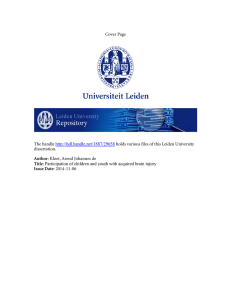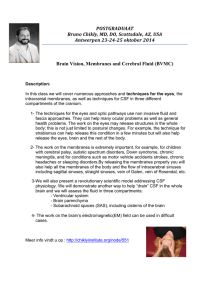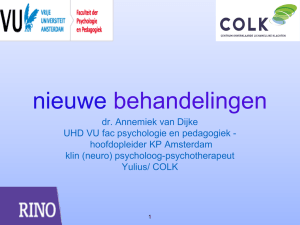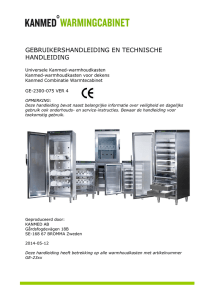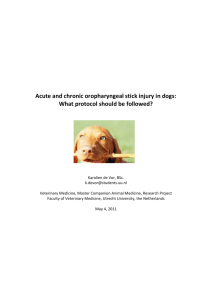09/09/2014 Neurogene koorts
advertisement
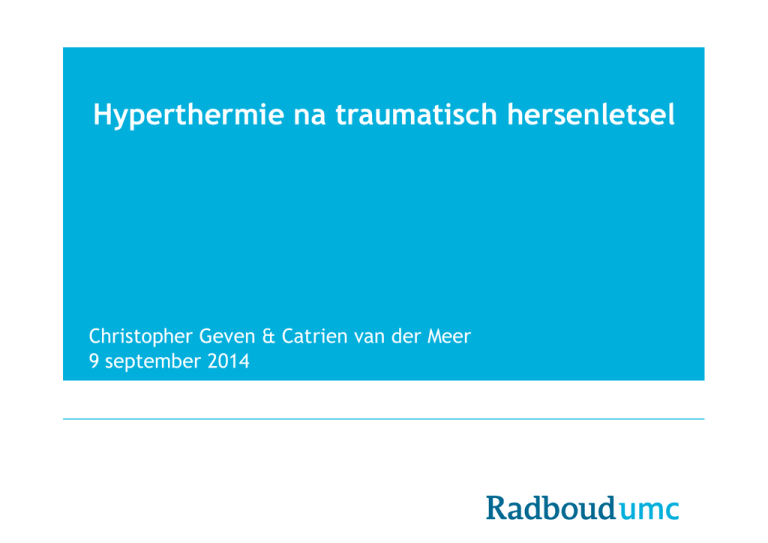
Hyperthermie na traumatisch hersenletsel Christopher Geven & Catrien van der Meer 9 september 2014 Casus: Man, 56 • Opgenomen na val van trap: • E1M1Vt • SAB, SDH, contusiehaarden, schedelbasis #, Th12-L1 #, clavicula en scapula # Re. • 26-8: decompressiecraniotomie • 2-9: start flucloxacilline i.v.m. S. aureus in sputumkweken DD • Infectieus? • Pneumonie • Meningitis • Lijnen • Gastro-enteritis ! • Niet-infectieus? • Fracturen • Medicamenteus • Neurogeen? “Neurogene koorts”: incidentie • NeuroIC patiënten algemeen: 78% T>38,0oC gedurende opname ! • Hyperthermie na ernstig traumatisch hersenletsel: • • Eerste 2 dg: 44% T>38,5oC Eerste wk: 73% T>38,4oC ! • Hyperthermie na aSAB: 50-60% ! • Voorspellende factoren hyperthermie na traumatisch hersenletsel: • • • • Diffuus axonale schade,OR 9,06 (95%CI 0,99-82,7) Frontaalkwab schade, OR 6,68 (95%CI 1,1-39,3) Schedelfracturen Lage initiële GCS - The significance of altered temperature after traumatic brain injury: an analysis of investigations in experimental and human studies: Part 2. British Journal of Neurosurgery. 2008. - Neurogenic fever after traumatic brain injury: an epidemiological study. J Neurol Neurosurg Pathofysiologie • Eerste 24 uur acute fase reactie. ! • Ontregeling thermoregulatie hypothalamus • Directe schade • Aan preoptische nucleus v/d hypothalamus en focale centra in de pons. • Bij obductiestudie 42,5% hyperthermiepatiënten na hersenletsel schade hypothalamus. • Bloed in liquor • Met name intraventriculair. Hyperthermia and fever control in brain injury. Crit Care Med. 2009. Hypothalamic lesions following closed head injury. Brain. 1971. Hyperthermie en outcome na TBI? - The significance of altered temperature after traumatic brain injury: an analysis of investigations in experimental and human studies: Part 2. British Journal of Neurosurgery. 2008. •‘ From the prospective studies, a tentative conclusion can be drawn that extremes of temperature are associated with worse outcomes.’ ! • ‘There is no clinical evidence for a causal relationship between raised temperature and worsened outcome after TBI.’ Therapeutisch hypothermie? A systematic review of therapeutic hypothermia for adult patients following traumatic brain injury. Crit Care. 2014. Take Home Message • Hyperthermie na ernstig traumatisch hersenletsel komt frequent voor. ! • Het is een diagnosis per exclusionem. ! • Ontstaat t.g.v. ontregelde thermoregulatie in de hypothalamus. ! • Therapeutische hypothermie verlaagt de ICP en kan toegepast worden bij refractaire verhoogde ICP’s. ! • Tevens lijkt therapeutische hypothermie de mortaliteit na ernstig traumatisch herseneletsel te verlagen.
